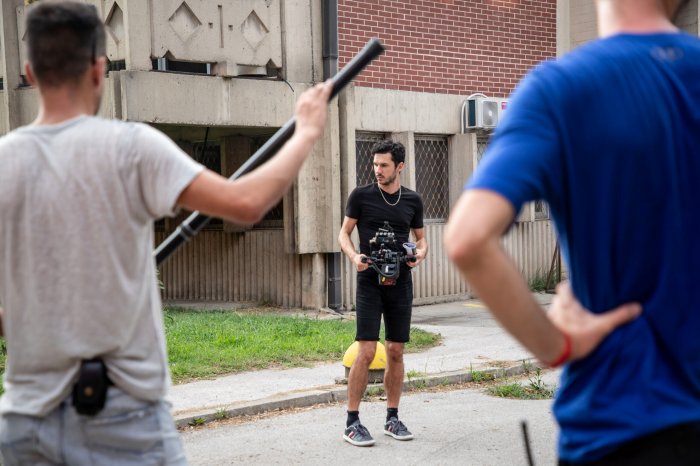Elliott Stein in 1976. | PHOTOFEST PHOTO ARCHIVE/ COURTESY BAM
Elliott Stein, as a writer, critic, and historian one of the true gentlemen of cinema –– in the tradition of sorely missed scholars like Henri Langlois, William K. Everson, and Andrew Sarris –– has died at the age of 83. Described as “a true cinematic multihyphenate” by the Brooklyn Academy of Music’s Cinématek, his writing appeared in the New York Times, the Village Voice, Rolling Stone, Sight and Sound, Film Comment, the Financial Times, Opera, and many other publications.
Born December 5, 1928 in Bensonhurst, Brooklyn, Stein fell under the sway of film when he saw “King Kong” in its original release in 1933 at Radio City Music Hall. The film remained his favorite, endlessly rewatched by him and the subject of a seminal article, “My Life with Kong,” in Rolling Stone. Leading the most peripatetic of lives, he entered NYU at age 15 as one of its first film students and then moved to Paris in 1948, where he lived for decades and was immersed in that city’s vibrant cinema culture. A regular visitor to the Cinematheque Francaise, he became friends with many of the filmmakers, like Jacques Rivette and other critic-turned-directors, who would forge the Nouvelle Vague movement in film.
Elliott Stein on the 1964 set of “The Masque of the Red Death,” with director Roger Corman and star Vincent Price. | PHOTOFEST PHOTO ARCHIVE/ COURTESY OF BAM
He wrote the libretto for Ned Rorem’s first opera, “A Childhood Miracle” and also claimed to have been a ghost-writer on Kenneth Anger’s notorious, legendary “Hollywood Babylon,” somehow earning Anger’s lasting enmity, which took the form of scary, obsessively satanic correspondences Stein once showed me. He worked on a number of films as writer, and as an actor appeared in Antony Balch’s “Bizarre” and Edgardo Cozarinsky’s “The Sorcerer’s Apprentice.” Stein was friends with leading intellectuals, like Susan Sontag, whose influential “Notes on Camp” he greatly influenced.
When BAM began its Cinématek in 1999, Elliott was hired as a programmer and he produced more than 120 magnificently eclectic “Cinemachats,” which consisted of the screening of a favorite film, followed by his inimitable comments. He began this series with John Brahm’s “Hangover Square” and ended it last month with André De Toth’s “Ramrod.”
I will sorely miss this unique, wonderful soul, who embodied not only a joi de cinema, but an ineffable joie de vivre itself. Always a total straight shooter, you could count on Elliott to always speak the truth, whether it was debunking the near saintly reputation of Vito Russo, who earned his lasting contempt for having sliced out crucial gay-related scenes from Museum of Modern Art film prints for his own use, or explaining his rather startling appearance in the documentary “Cinemaniacs,” a study of a group of obsessive Manhattan film lovers. At one point in the film, as the lights come up after a screening, you see Stein adjusting his trousers and buckling his belt. His explanation: “I had just had a huge Greek lunch and my pants were too tight around the waist, so I had gotten comfortable. It looked like I was jerking off. I should sue them for including that footage!”
The fact that he never did attests to his unfailing generosity. He was unstintingly supportive of other writers and young filmmakers, especially if they were gay, in a business which is not always noted for its bigness of heart. He was an early, enthusiastic champion of Lee Daniels, for example, and I, for one, will always treasure his comment to me: “Since Pauline Kael died, there’s no one fun to read any more. Except you.”
Stein was not only an invaluable source of film history, but gay history as well. The most fabulous raconteur, he could regale you for hours with queer lore, like how the mausoleums in the Paris cemetery Père Lachaise provided great gay trysting places. Or, how Charles Laughton, in the middle of a restaurant, responded to his comely young companion’s request “Mr. Laughton, can I have champagne?” by yelling, “‘Mr. Laughton, Mr. Laughton!’ I’ve been sucking your ass all night and you call me Mr. Laughton! Ask ‘Charlie’ for your champagne, and you’ll get it!’” An inveterately lusty soul and shining example of how to age well, he was attending sex parties well into his 70s and didn’t hesitate to talk about them in the most delightful detail.
Stein retained his brilliantly febrile mind and feisty spirit right up until the end, indefatigably making it to crucial screenings in poor health and a wheelchair. His passing leaves a huge, gaping hole in Manhattan cultural life, like that now occupied on 53rd Street, where Art Moderne treasure the Donnell Library, another crucial film source, has been senselessly demolished to make way for another luxury high rise for the one percent.
A memorial service is being planned for him, and, in December, BAMcinématek will screen one of his favorite films, Valerio Zurlini’s “The Desert of the Tartars.” I just hope Elliott’s enjoying himself in that great Loew’s Paradise in the sky, hanging with Lubitsch, Nick Ray, Arletty, and Guy Madison.




































